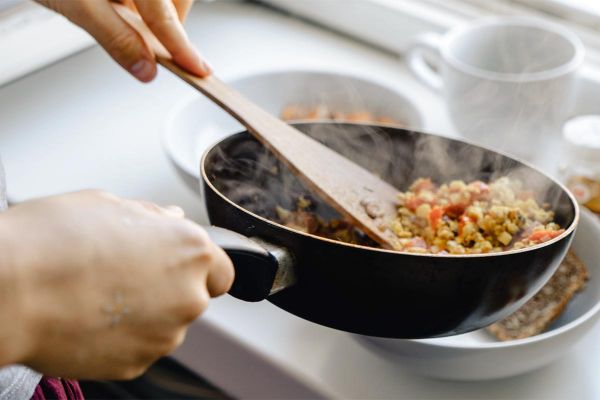 Addiction recovery is a long process that takes years, if not the rest of your life. It involves rebuilding your physical and mental health, learning new habits and behaviors, and creating coping mechanisms for cravings, stress, and life. While a rehabilitation center will give you the tools to do so, building your healthy and happy life outside of recovery is up to you. Today, nutrition is increasingly seen as a critical element of recovery, with many rehabilitation programs offering nutrition programs and implementing nutritional therapy into treatment plans.
Addiction recovery is a long process that takes years, if not the rest of your life. It involves rebuilding your physical and mental health, learning new habits and behaviors, and creating coping mechanisms for cravings, stress, and life. While a rehabilitation center will give you the tools to do so, building your healthy and happy life outside of recovery is up to you. Today, nutrition is increasingly seen as a critical element of recovery, with many rehabilitation programs offering nutrition programs and implementing nutritional therapy into treatment plans.
This is at odds with the tendency of recovering addicts to binge on caffeine and sugar, leaving healthy foods behind in favor of quick surges of dopamine from fat, salt, and sugar. But, improving nutrition can help your recovery in more ways than one and building healthy eating habits will significantly aid you on your way to a full recovery.
How Substance Use Disorder Affects Nutrition
What does nutrition have to do with a substance use disorder? Food is, not surprisingly, heavily linked to substance abuse. People who abuse drugs and alcohol are more likely to make poor food choices, more likely to struggle with eating disorders, and more likely to suffer from nutrition-related illnesses such as nutrient deficiencies. In fact, some 70% of patients in addiction treatment centers also suffer from nutrition deficiencies. That’s critical considering deficiencies in key nutrients like iron, vitamin D, or vitamin A can result in debilitating physical and mental symptoms that are significantly likely to lead to a relapse.
Finally, individuals struggling with substance use disorder are significantly likely to have physical damage to the gastrointestinal tract. This inhibits the body’s ability to absorb key nutrients, and greatly increasing the importance of eating well. Why? An individual with a healthy gastrointestinal tract can absorb enough nutrients from a wider variety of food, where someone with damage and inflammation will absorb a smaller percentage of what passes through, necessitating a higher intake of the same nutrients for the same benefit. This is especially true of alcohol and opioid users, who typically take years to recover from gastrointestinal damage.
Poor nutrition results in malnutrition, metabolic syndrome, and poor liver health, which impact your mood, physical health, and energy levels over the long-term. Adopting a healthy diet will work to improve these issues, reducing the impacts of long-term substance abuse on the body, and helping you to feel better long-term.
Making Poor Food Choices in Recovery
 Most people are very aware that a stoned or high person is more likely to order a pizza than to make a salad, but few are aware that these poor food choices continue into recovery. The reasons link to the addiction, to habit, and to the individual’s behavior, which may have contributed to beginning an addiction in the first place. Here, food that is high in fat, salt, and sugar content is more likely to trigger the reward circuit, releasing dopamine (a neurotransmitter that creates a desire to do an action such as eat more pizza) and serotonin (a neurotransmitter that causes a feeling of pleasure or happiness).
Most people are very aware that a stoned or high person is more likely to order a pizza than to make a salad, but few are aware that these poor food choices continue into recovery. The reasons link to the addiction, to habit, and to the individual’s behavior, which may have contributed to beginning an addiction in the first place. Here, food that is high in fat, salt, and sugar content is more likely to trigger the reward circuit, releasing dopamine (a neurotransmitter that creates a desire to do an action such as eat more pizza) and serotonin (a neurotransmitter that causes a feeling of pleasure or happiness).
Persons with substance use disorders are “sensation seeking”, meaning they seek out those feelings of reward. This doesn’t change when someone stops using drugs or alcohol and most people continue to abuse the same habits, which were reinforced by seeking out “easy” foods during addiction for convenience.
Binge Eating – Persons in recovery often resort to binge eating and drinking, because it makes them feel good. Most of us are aware of the term “emotional eating”, and binge eating in recovery is a similar concept. People feel depressed, down, anxious, or feel very little because of substance abuse. Fat, sugar, salt, and caffeine temporarily change that. The pleasure sensation of eating something tasty temporarily stimulates the reward system and we don’t want to stop. We temporarily feel better. But, this binge-eating can lead to a pattern that can result in a new food addiction or in relapse. In fact, many people in recovery can’t actually tell the difference between a craving for sugar and a craving for the substance they used to abuse.
What does this all mean for you? Creating healthy eating habits could actually help you to stay in recovery by reducing your chance of relapse. At the least, a healthy diet will prevent you from developing a reliance on sugar, salt, or fat, which will harm your health in large doses. Eating balanced meals also reduces the chances of energy crashes, which can also contribute to relapse.

Effects on Mental Health
Poor nutrition dramatically affects your mental health. In fact, nutritional deficiencies have symptoms mirroring many mental disorders including depression, anxiety, and paranoia. Individuals with a substance use disorder are as much as 70% likely to have a nutritional disorder, which means they are more likely to be depressed, to have no energy, to suffer from anxiety, to have mood imbalances, and to have mood swings.
Correcting these problems can take several months or more of nutritional therapy. In some cases, nutritional imbalances or deficiencies will be recognized in rehab.
In other cases, you may want to request a blood test reviewing levels of important nutrients and then requesting a diet program to fix issues. Stress, mood imbalances, depression, and anxiety are each significant risk factors for relapse and for addiction. Working to improve mental health will give you a better basis with which to stay in recovery.
What is “Healthy Nutrition”?
Healthy nutrition typically means eating a balanced diet, according to government recommendations. The U.S. offers a free app, “My Plate” to help individuals make healthy choices for a balanced diet. You could adopt this for standard healthy eating.
However, “healthy” significantly changes depending on the individual, their existing nutrition, and their dietary requirements. If you have nutrient deficiencies, you may need a special diet recommended by a medical professional. Here, treatment like medical nutritional therapy (MTN) and nutritional therapy can help you to recover from specific ailments such as nutrient deficiencies.
A healthy diet is about making long-term changes to your diet. This means you don’t have to be and shouldn’t be perfect. It’s still fine to have a pizza on the weekends or a glass of soda. It’s just that you want to ensure that most of your diet is good for you. Achieving this may mean taking cooking classes, adopting food-management apps, planning your meals for a week in advance, food prep, or any of a number of other strategies. Most communities offer significant resources to help individuals prepare and eat healthy meals. Getting involved in those communities could have more benefits than one, as you’ll likely make new friends, meet new people, and learn new things.
Nutrition is important for everyone, but more so for anyone with an existing health or mental disorder such as a substance use disorder. Talk to your doctor or see a nutritionist before making dramatic changes to your diet.
At the Gooden Wellness Center, we offer support for both, with a holistic program designed to treat every aspect affecting depression. Contact us today at 800-931-9884 for a free assessment, or a free tour of our residential mental wellness facility in Pasadena.